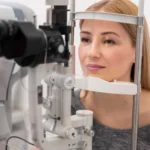
The Benefits and Risks of LASIK Surgery: Is It Right for You?
October 1, 2025
The Importance Of Routine Gynecological Exams For Early Detection
October 1, 2025Accelerated transcranial magnetic stimulation (TMS) is an innovative approach to brain stimulation that condenses a traditional weeks-long treatment schedule into a matter of days. This non-invasive procedure applies magnetic pulses to specific areas of the brain associated with mood regulation and pain perception. By delivering multiple sessions per day over a shorter period, accelerated TMS aims to provide relief for individuals with certain health conditions, including chronic pain and depression. Here’s more information on accelerated TMS and how it is utilized to benefit patients:
How Does Transcranial Magnetic Stimulation Work?
Transcranial magnetic stimulation (TMS) is a procedure that uses magnetic fields to stimulate nerves, or neurons, in the brain. During a session, a specialized electromagnetic coil is put against the scalp near the forehead. The device painlessly delivers magnetic pulses that pass through the skull and stimulate neurons in targeted brain regions. This process influences brain activity and connectivity.
TMS procedures are done while the individual is awake and seated comfortably. Each session typically lasts between 20 to 40 minutes, and no anesthesia is necessary. Accelerated TMS treatment has a variety of applications, since it provides a non-surgical way to modulate brain function. Researchers are continually exploring its potential uses across a spectrum of neurological and psychiatric conditions.
What Health Conditions Can TMS Treat?
TMS therapy has been recognized for its application in treating various health conditions, primarily those related to mental and neurological health. It is most commonly known for its use in treating major depressive disorder. TMS is primarily for individuals who have not found relief from other treatments, like medication and psychotherapy, for their mental or neurological condition.
Mental Health Conditions
Beyond depression, TMS has the potential to address other mental health challenges. These include obsessive-compulsive disorder (OCD), where it can be used to target brain circuits involved in compulsive behaviors. It is also being investigated for anxiety disorders, post-traumatic stress disorder (PTSD), and bipolar disorder, with the goal of modulating the neural activity associated with these conditions.
Other Brain-Related Conditions
The application of TMS extends to other neurological and brain-related health issues. Magnetic stimulation is a potential option for managing chronic pain by targeting the brain’s pain-processing centers. Research is ongoing into its use for migraine headaches, Parkinson’s disease, and post-stroke recovery to help improve motor function and other symptoms.
Some other health conditions that this therapy helps manage include:
- Addictions
- Brain Injuries
- Fibromyalgia
What Are the Different Types of TMS?
TMS therapy is delivered in several forms, each differing in the pattern and frequency of the magnetic pulses. Standard TMS typically involves daily sessions over a period of four to six weeks. Accelerated TMS compresses this timeline into just a few days. Another variation is deep TMS (dTMS), which uses a different coil design to stimulate deeper and broader brain regions. Theta-burst stimulation (TBS) is a newer form that increases the electrical pulses per session, commonly speeding up treatments.
While TMS is generally well-tolerated, some individuals may experience mild and temporary side effects. These may include:
- Pain at the Stimulation Site
- Headaches
- Tingling Scalp or Facial Muscles
- Lightheadedness
These symptoms usually resolve shortly after a session and tend to decrease over the course of the treatment period.
Learn More About Accelerated TMS
Accelerated TMS represents a developing field in neuromodulation, offering a condensed treatment schedule for individuals seeking relief from conditions like chronic pain and depression. As with any medical procedure, understanding the process, applications, and potential outcomes is key. To learn if TMS is right for you, consult with a qualified provider today.





